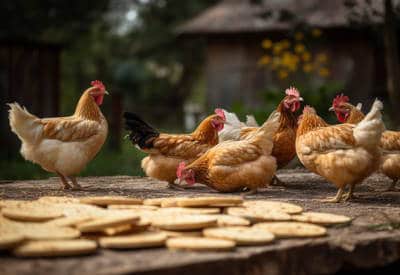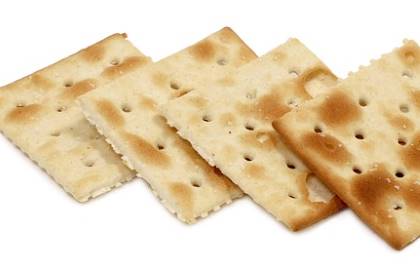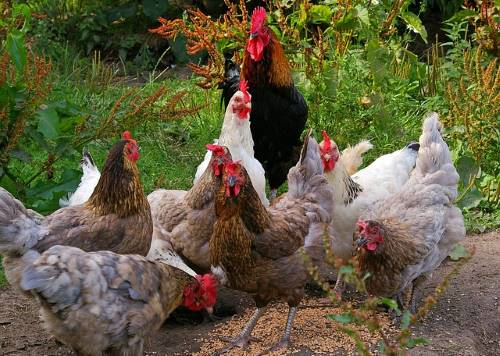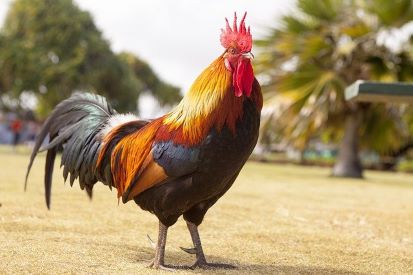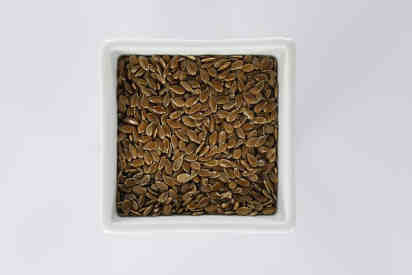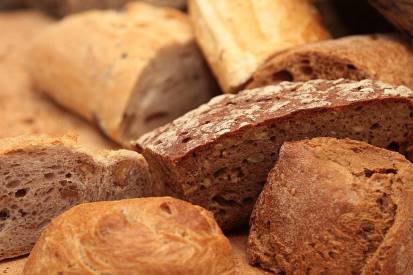If you’re anything like me, you’ve probably observed your feathered friends pecking away in the yard, only to be struck with a random question – can chickens eat crackers? After all, those savory snacks we humans enjoy are made mostly from grains, which are a staple in a chicken’s diet, right? Well, my curious friends, the answer is yes, chickens can eat crackers, but it’s not as simple as that.
As a chicken owner, it’s our responsibility to ensure we’re feeding our flock what they can eat and what they should eat. The well-being of our chickens is intrinsically tied to their diet, and while treats can bring variety and fun into their daily routine, it’s essential to ensure those treats are safe and beneficial to our feathered friends.
So, let’s dig a little deeper into this cracker conundrum. How do crackers fit into a chicken’s diet? What benefits and risks might they bring? Are some crackers better than others? If these are questions you’ve found yourself pondering, stick around.
Understanding the Chicken Diet
Let’s start with a quick look at what chickens naturally eat. In an ideal world, chickens enjoy a fascinating diet of grains, greens, and insects. Not exactly what you’d see on a human dinner plate, huh? But that’s just what keeps our feathered friends clucking along in good health.
On the farm or in the backyard, this diet is usually supplemented by commercial poultry feed to ensure that chickens get a balanced and complete diet. This feed is designed to provide all the nutrients your chickens need, from proteins to vitamins and minerals.
Basics of a Chicken’s Nutritional Needs
Like all animals, chickens need a balanced diet to maintain good health and produce the best quality eggs. This includes carbohydrates for energy, proteins for growth and egg production, fats for energy storage, and vitamins and minerals for various metabolic processes.
What Chickens Naturally Eat
Left to their own devices, chickens are fantastic foragers. They’ll scratch and peck through the day, devouring various foods, from grains and seeds to insects and greens.
Role of Commercial Poultry Feed in a Chicken’s Diet
While chickens can find much of their diet through foraging, commercial poultry feed is vital to ensure a balanced diet. The feed is typically made from grains, seeds, and other plant-based ingredients, fortified with necessary vitamins and minerals.
[ChickenAffiliate]
Exploring Human Foods for Chickens
Now, onto the question of human food for chickens. As you’ve probably guessed, not all human foods are suitable for chickens. Some are safe and nutritious, while others should be strictly avoided to prevent health problems.
Safe Human Foods for Chickens
There are plenty of human foods that are safe and healthy for chickens. These include vegetables like carrots and broccoli, grains like oats and rice, and even some fruits like apples and berries. Remember, these should be offered in moderation as treats, not as a substitute for their main feed.
Human Foods Chickens Should Avoid
On the other hand, some foods like chocolate, onions, and raw potatoes are harmful to chickens and should always be avoided. These foods contain substances that can be toxic to chickens, affecting their health and egg production.
How to Offer Human Foods to Chickens
Human foods should be offered as treats, not as a replacement for a balanced chicken diet. It’s also crucial to ensure that any food given to your chickens is fresh and free from mold or other contaminants.
The Question: Can Chickens Eat Crackers?
You’re sitting there on your porch, a box of forgotten crackers found at the back of your pantry in hand and a group of pecking chickens at your feet. You find yourself wondering, can chickens eat crackers?
The short answer is yes; chickens can technically eat crackers. But, as is often the case with feeding human foods to animals, the longer answer is a bit more complex. It’s not just about whether chickens can eat something, but whether they should.
Ingredients Typically Found in Crackers
To answer this question, let’s break down what’s in those crackers you’re holding. Crackers are primarily made from grains – typically wheat – which chickens enjoy. This base grain provides carbohydrates, giving your chickens a quick energy boost.
However, if you’ve ever looked at the ingredient list on a cracker box, you’ll notice it’s not just grain. Crackers often contain added salt, oil, and sometimes sugar. They may also contain artificial flavors, colors, and preservatives. While these ingredients make crackers tasty for humans, they’re not part of a chicken’s natural diet.
Potential Nutritional Value of Crackers for Chickens
In terms of nutritional value, crackers do provide some energy-dense carbohydrates. This might be beneficial when your chickens need more energy to stay warm in colder weather. However, it’s worth noting that the carbs in crackers are not accompanied by the beneficial fiber found in grains in their whole form.
In addition, crackers aren’t a good source of protein – a crucial part of a chicken’s diet, especially if they’re laying eggs. Crackers also don’t offer much of the vitamins and minerals that chickens need for overall health.
In short, while chickens can safely consume crackers, these crunchy snacks don’t offer much nutritional value for our feathered friends. They should be considered more of a treat than a dietary staple.
Pros and Cons of Feeding Chickens Crackers
We’ve established that chickens can nibble on crackers without immediately keeling over, but should they? To answer this question, let’s examine the potential pros and cons of feeding your chickens these crunchy human treats.
Potential Benefits of Crackers in a Chicken’s Diet
Let’s start with the positives. One clear benefit is that most chickens find crackers delicious. Their crunchy texture and grain-based flavor make them an exciting change from the usual feed. This novelty can be good for your chickens’ mental stimulation.
Secondly, crackers do provide a quick source of energy. They are high in carbohydrates, which can be beneficial in colder weather when chickens need more energy to maintain their body temperature. However, this energy is quickly metabolized and won’t sustain them as long as their regular feed does.
Possible Risks and Drawbacks of Crackers for Chickens
Now, onto the less rosy side of the cracker equation. One of the most significant potential drawbacks is the salt content in many crackers. Chickens require some salt, but not in large amounts. Too much salt can harm them, leading to salt toxicity, which can cause serious health issues, including increased thirst, wet droppings, and in severe cases, even death.
Another drawback is that while chickens might love the taste and texture of crackers, these treats offer very little nutritional value. Crackers lack the proteins, vitamins, and minerals that chickens need to stay healthy and lay quality eggs. Crackers could fill your chickens up when fed in excess, leading them to eat less of their regular, nutritious feed.
Finally, some crackers contain artificial additives like colors, flavors, and preservatives. While these make crackers more appealing to us humans, they’re not so great for chickens. Their bodies aren’t designed to process these artificial substances, and over time, this could potentially lead to health problems.
Feeding Guidelines: Crackers for Chickens
So, if you decide to give your chickens some crackers, how should you go about it? Let’s discuss portion sizes, frequency, and the impact of different types of crackers.
Appropriate Portion Sizes for Chickens
Chickens only need a small amount of crackers. A couple of crumbled-up pieces per chicken is plenty.
How Often Should Chickens Be Fed Crackers?
Crackers should be considered a treat, not a staple. Offering crackers once a week or so should be enough to keep your chickens happy without affecting their diet negatively.
Different Types of Crackers and Their Impact on Chickens’ Health
Not all crackers are created equal. Some are high in salt or contain artificial flavors or preservatives, which aren’t good for your chickens. Stick to plain, low-salt crackers where possible.
Alternatives to Crackers for Chicken Treats
If you’re worried about the potential downsides of feeding your chickens crackers, don’t fret! There are plenty of alternative treats that your chickens will love.
Healthy Treats Chickens Love
There are many healthy treat options for chickens that they’ll gobble right up. Fruits and vegetables are always a good choice, as are grains and seeds.
Incorporating Variety into a Chicken’s Diet
Variety is important for chickens, just as it is for us. It keeps their diet interesting and ensures they get a range of nutrients. Consider rotating the treats you offer for a varied and balanced diet.
Simple Recipes for Homemade Chicken Treats
If you’re feeling adventurous, there are many simple recipes for homemade chicken treats. These can be a fun way to use leftover ingredients, and your chickens will love them. From scrambled eggs to homemade seed blocks, the possibilities are endless.
What Other Grain-Based Snacks Can Chickens Eat Apart from Crackers?
If you’re a chicken owner who loves to treat your flock, you might wonder what other grain-based goodies from your pantry can be passed onto your feathered friends. Well, let’s cluck right to it and explore five grain-based snacks you might consider.
Bread
Just like crackers, bread is a treat that chickens can enjoy. However, also like crackers, bread doesn’t provide much in the way of nutrition for your flock. The high carbohydrate content will fill your chickens up without giving them the protein, vitamins, and minerals they need. Therefore, bread should be fed to chickens sparingly and always in addition to a balanced diet.
Read More: Can Chickens Eat Bread? Uncovering The Truth For Your Flock
Cheerios
Cheerios are safe for chickens and can be quite a hit due to their shape and crunch! They’re low in sugar and salt, making them a better choice than many other cereals. However, they’re not a particularly nutrient-dense food, so while they’re an occasional fun treat, they shouldn’t replace your chickens’ regular feed.
Read More: Can Chickens Eat Cheerios? Uncovering The Pecking Truth
Cereal
There are many different types of cereal, so it’s hard to make a blanket statement. However, as a rule of thumb, any cereal low in sugar and salt and free from artificial flavors and colors are safe for chickens to eat in moderation. Always check the ingredients before sharing your breakfast cereal with your chickens.
Read More: Can Chickens Eat Cereal? Uncovering The Do’s And Don’ts
Tortillas
Chickens can safely eat both corn and flour tortillas. They’ll love the different textures and the fun of pecking at these flatbreads. Just make sure the tortillas are free from mold and not seasoned with any ingredients that could harm chickens, like garlic or onion powder.
Read More: Can Chickens Eat Tortillas? Unveiling The Truth For Healthy Flocks
Rice Krispies
Rice Krispies are safe for chickens to eat. They’re low in sugar and don’t contain any ingredients that are harmful to chickens. Plus, chickens will enjoy the novelty of the popping and crunching of the cereal! As with other treats, just remember to offer them in moderation.
Read More: Can Chickens Eat Rice Krispies? A Comprehensive Guide
Can chickens eat crackers – final thoughts
Our feathery friends can surely enjoy a cracker or two occasionally. But remember, while it’s okay for chickens to eat crackers, it’s all about moderation. Like most things, too much of a good thing can lead to problems. High salt content, lack of nutrients, and potential artificial additives mean that crackers shouldn’t replace those scrumptious grains, insects, and commercial feed in your chickens’ diet.
Let’s think of crackers as the chicken equivalent of human junk food – an occasional treat, a delightful break from the routine, but not the main course. Treat your chickens to a varied and balanced diet, and you’ll have a flock of clucking, healthy hens providing you with the freshest, tastiest eggs.
Related Articles:

